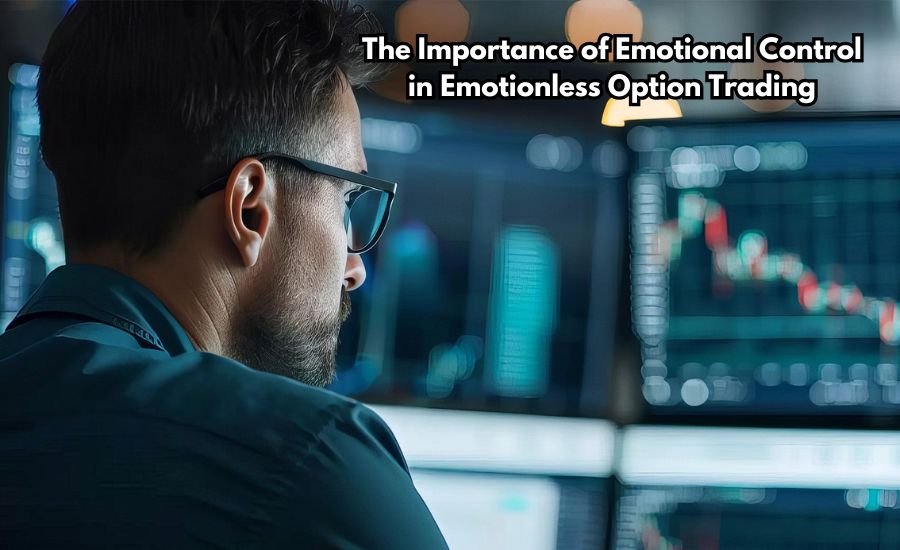Emotionless option trading is a powerful strategy that eliminates emotional influences like fear, greed, and excitement from the decision making process. By adopting this approach, traders can make well thought out, data driven choices, leading to more consistent and profitable outcomes. In the fast paced world of options trading, where the market can shift unexpectedly, staying calm and following a plan can make all the difference in achieving success.
When you practice emotionless option trading, you remove the stress and overconfidence that often cause traders to make impulsive decisions. Instead of letting emotions control your actions, you stick to a solid strategy, making logical choices based on data and trends. This disciplined approach helps minimize losses and ensures you’re making smarter, more calculated trades in every situation.
The Importance of Emotional Control in Emotionless Option Trading

In emotionless option trading, emotional control is essential to ensure consistent success. When emotions like fear and greed take over, traders may make impulsive decisions that contradict their strategies. A calm, rational approach helps to avoid the emotional pitfalls that often lead to losses in the market. By mastering emotional control, traders can stick to their plans and avoid knee jerk reactions, maintaining a consistent approach to trading.
This discipline is particularly crucial in fast paced markets, where emotional reactions can cause traders to enter or exit positions prematurely. Over time, with consistent practice, traders can learn to separate their emotions from their trading decisions, leading to a more strategic and less stressful trading experience. Ultimately, emotional control is the foundation of emotionless option trading, enabling traders to stay focused on long term goals without being distracted by short term volatility.
Key Strategies for Emotionless Option Trading
Effective emotionless option trading relies on a set of strategies that minimize emotional involvement. One of the most effective strategies is setting clear entry and exit points for each trade. When traders have predefined rules and stick to them, emotions are less likely to dictate decisions. These strategies foster consistency and reduce the likelihood of emotional trading decisions, making the process more systematic and reliable.
Another key strategy is risk management. By determining in advance how much of their portfolio they are willing to risk, traders can prevent the anxiety that comes with unpredictable market movements. These strategies help traders to focus on the long term picture, reducing the tendency to make emotionally charged decisions in response to short term market fluctuations. With these strategies in place, emotionless option trading becomes more attainable and effective for both beginners and experienced traders.
Building a Routine for Emotionless Option Trading
A strong routine is a fundamental aspect of emotionless option trading. By establishing a set daily routine that includes checking market conditions, reviewing trading plans, and practicing self reflection, traders can better manage their emotions. This structure helps traders approach each trading day with a clear and calm mindset, reducing impulsive decision making. It also ensures that traders stay focused on their trading goals, rather than being swayed by unpredictable market conditions.
Having a routine also includes reviewing previous trades and learning from mistakes. This allows traders to refine their strategies and reduce emotional decision making over time. When routines are established and followed consistently, traders are better equipped to maintain emotional control, even in volatile markets, ensuring a more disciplined approach to emotionless option trading that enhances performance over time.
Managing Risk to Prevent Emotional Reactions in Emotionless Option Trading
Managing risk is one of the key components of emotionless option trading. Traders who focus on risk management are less likely to make decisions based on fear or greed. By setting stop loss orders and determining risk to reward ratios before making trades, traders can avoid knee jerk emotional reactions. This creates a framework where emotions do not control decision making, allowing for more strategic trading in any market condition.
Risk management helps traders set realistic expectations and prepare mentally for potential losses. Accepting that not every trade will be profitable allows traders to focus on the process rather than the outcomes. By focusing on managing risk rather than chasing profits, traders can maintain emotional detachment, which is the essence of emotionless option trading. This approach is especially beneficial in highly volatile markets, where maintaining calm is crucial for success.
The Role of Discipline in Emotionless Option Trading
Discipline is a cornerstone of emotionless option trading. A disciplined trader follows their plan without deviation, even in the face of market volatility. Emotional decisions often lead to impulsive actions that stray from a pre established strategy, causing avoidable losses. Discipline, therefore, helps keep traders on course, focusing on long term goals and ensuring consistency in their approach.
Being disciplined means resisting the temptation to chase trends or deviate from one’s trading strategy. It also involves the ability to accept losses gracefully, without letting them affect future decisions. Over time, traders who consistently practice discipline can achieve steady, emotion free trading experiences, making emotionless option trading a reliable and profitable approach for those committed to following their plan.
Utilizing Technical Analysis to Support Emotionless Option Trading

Technical analysis is an essential tool for emotionless option trading. By relying on charts, indicators, and historical data, traders can make informed decisions based on facts rather than emotions. This type of analysis takes the subjectivity out of trading, reducing emotional decision making and helping traders stay objective. It provides traders with a concrete framework for making decisions based on data, not feelings.
Technical analysis also allows traders to spot patterns and trends that can inform their decisions. Instead of reacting emotionally to market movements, traders can use the data to guide their actions, resulting in more rational and well thought out trades. This reliance on technical analysis is a key aspect of emotionless option trading, as it helps traders avoid impulsive decisions and stay focused on logical, data driven actions.
How to Develop Emotional Resilience for Emotionless Option Trading
Emotional resilience is crucial for emotionless option trading. Traders who develop the ability to stay calm under pressure are better equipped to handle the inevitable ups and downs of the market. Emotional resilience involves accepting losses and setbacks without letting them disrupt the trader’s mental state or affect their future decisions. This inner strength allows traders to maintain a clear and rational mindset, even in volatile conditions.
To build emotional resilience, traders can practice mindfulness, meditation, or other techniques that promote mental clarity. This resilience helps prevent traders from becoming emotionally attached to their positions or reacting impulsively to market movements. With emotional resilience, traders can maintain a calm and logical approach, a key characteristic of emotionless option trading that minimizes the emotional toll of trading.
Creating a Trading Plan for Emotionless Option Trading
A well crafted trading plan is essential for emotionless option trading. A trading plan defines a trader’s goals, strategies, and risk management techniques, helping to create a clear framework for decision making. When traders follow a plan, they are less likely to be influenced by emotions, as their decisions are based on predetermined rules. The clarity a plan provides helps traders stay focused on their overall objectives, not on temporary emotional impulses.
The plan should include clear entry and exit points, as well as stop loss levels to limit potential losses. With a solid plan in place, traders can stay focused and avoid impulsive reactions to market fluctuations. This structured approach helps traders remain objective, making emotionless option trading more achievable and effective. Adhering to the plan reduces the risk of emotional decision making and promotes consistency in trading actions.
Why Patience Is Key in Emotionless Option Trading
Patience is a vital quality for emotionless option trading. In a market where volatility is common, patience helps traders wait for the right opportunities rather than rushing into trades. Impulsive trading decisions driven by impatience can lead to unnecessary losses. By practicing patience, traders can avoid emotional reactions and make more thoughtful decisions, waiting for the perfect entry points rather than forcing trades.
Patience also helps traders to stick with their strategies even when faced with short term market fluctuations. Traders who understand that good opportunities will come with time can stay calm and resist the urge to act impulsively. This patience is essential for emotionless option trading, allowing traders to make informed decisions and stay disciplined in the face of uncertainty. Over time, this approach can lead to more successful and consistent trading outcomes.
The Psychology Behind Emotionless Option Trading

The psychology of emotionless option trading involves understanding how emotions can affect decision making. Fear, greed, and overconfidence can lead to poor trading choices, but by acknowledging these psychological factors, traders can better control them. Understanding one’s emotional triggers is key to maintaining a rational approach, as emotional responses often skew decision making processes.
Traders who work to understand their emotions can put strategies in place to counteract their influence. For example, recognizing that fear of loss can lead to hasty decisions can prompt a trader to pause and evaluate the situation. This psychological awareness helps keep emotions at bay, ensuring that emotionless option trading remains the focus of each decision. With this awareness, traders can build a more objective mindset, improving their overall trading performance.
Things You Have To Know: Crypto-mining-setups-basement-minecraft-build-your-own-mining-operation
The Benefits of Emotionless Option Trading for Long Term Success
Emotionless option trading provides several benefits that contribute to long term success. By reducing the emotional component of trading, traders are able to make decisions based on logic and strategy, rather than impulse. This leads to more consistent results over time and prevents traders from making costly mistakes based on short term emotions. The long term benefits are clear: traders who practice this approach tend to have better overall returns.
Over time, this approach allows traders to develop a reputation for consistency and reliability in the market. Instead of chasing every opportunity, they are focused on their strategies and goals, which fosters long term profitability. Emotionless option trading helps traders avoid the emotional ups and downs, creating a stable path for future success. This steady approach is one of the most reliable ways to succeed in the ever changing world of options trading.
Overcoming Fear and Greed in Emotionless Option Trading
Fear and greed are two emotions that can derail emotionless option trading if not controlled. Fear often leads traders to exit positions too early, while greed can result in holding on for too long. Overcoming these emotions involves recognizing their influence and creating strategies that prevent emotional decision making. Traders who learn to manage fear and greed can take more rational, objective actions based on their trading plans.
Traders can manage fear by setting predetermined stop loss orders and understanding that losses are part of the process. Greed can be countered by sticking to profit taking strategies and avoiding the temptation to exceed pre established targets. By mastering the management of these emotions, traders can maintain a logical, consistent approach to trading, which is key for emotionless option trading.
The Impact of Stress on Emotionless Option Trading
Stress can severely impact a trader’s ability to engage in emotionless option trading. When under stress, traders may experience heightened emotional responses that can lead to impulsive decisions and poor judgment. Stress management techniques, such as exercise or mindfulness, can help traders stay calm and maintain focus, reducing the influence of stress on their trading decisions.
By learning to manage stress effectively, traders can maintain a clear mind, which is essential for emotionless option trading. This helps them stay objective and adhere to their trading strategies, even in challenging market conditions. Reducing stress allows traders to approach each trade with a clear perspective, improving decision making and enhancing their overall trading performance.
Why Consistency Matters in Emotionless Option Trading

Consistency is a fundamental principle in emotionless option trading. Traders who remain consistent in their strategies, risk management, and decision making processes are less likely to be swayed by emotions. A consistent approach allows traders to stick to their plans and execute trades in a methodical, disciplined manner. This focus on consistency helps traders maintain a steady course, even when market conditions fluctuate.
Being consistent in applying trading strategies ensures that traders do not make decisions based on emotional impulses. They are better able to stay true to their trading plans, resulting in a more disciplined and logical approach to each trade. Emotionless option trading thrives on consistency, as it helps traders avoid emotional distractions and stay focused on their long term objectives.
The Role of Mindfulness in Emotionless Option Trading
Mindfulness plays a significant role in emotionless option trading. It helps traders become aware of their thoughts and emotions, allowing them to make decisions based on present circumstances rather than past experiences or emotional reactions. Mindfulness techniques, such as deep breathing and meditation, can improve emotional control and focus, making it easier for traders to stay calm in high pressure situations.
By practicing mindfulness, traders can gain clarity and make decisions without being clouded by emotional reactions. This mental clarity is crucial in emotionless option trading, where staying calm under pressure leads to more rational, strategic decisions. Mindfulness techniques help traders stay centered, reducing emotional influences and promoting a more deliberate approach to trading.
Conclusion
In conclusion, emotionless option trading is all about staying calm and making smart decisions without letting feelings take over. By sticking to a clear plan and following strategies like stop loss orders, traders can avoid the stress and panic that often lead to poor choices. It’s like playing a game where you don’t let the excitement or disappointment change how you play. When you make decisions based on facts and not feelings, you’re more likely to be successful in the long run.
To truly master emotionless option trading, practice and reflection are key. Using tools like trading journals can help you learn from past trades and understand when emotions affected your choices. By practicing in simulated environments, you can get better at controlling your emotions before you trade with real money. Over time, emotional control will become second nature, making you a more confident and consistent trader. The goal is to always make decisions with a clear mind, keeping emotions in check and following your plan for success.
Read You Have To Know: Bitcoin-spiral-chart-2024
FAQs
What is emotionless option trading?
Emotionless option trading is a strategy that helps traders avoid making decisions based on emotions like fear, greed, or excitement. Instead, it focuses on using a predefined plan and logical analysis to make decisions.
How can I achieve emotionless option trading?
To achieve emotionless option trading, you need to develop a solid trading plan, use risk management tools like stop loss orders, and stick to your strategy without reacting to market fluctuations emotionally.
Why is emotionless option trading important?
Emotionless option trading is important because emotions can cloud judgment and lead to impulsive decisions, which can result in losses. By trading without emotions, you make more rational and consistent decisions.
What are the benefits of emotionless option trading?
The benefits include better decision making, reduced stress, and more consistent profits. By removing emotions, you are more likely to stick to your trading plan and avoid unnecessary risks.
Can emotionless option trading help me reduce losses?
Yes, emotionless option trading helps reduce losses by ensuring that you don’t let emotions like fear or greed drive your decisions. This approach helps you stick to your predefined stop loss and profit taking rules.
How do emotions affect option trading?
Emotions such as fear, greed, and excitement often lead to poor decisions in option trading. Emotionless option trading helps avoid these emotional pitfalls by focusing on strategy and data instead of feelings.
Is emotionless option trading suitable for beginners?
Yes, emotionless option trading is suitable for beginners because it helps establish a disciplined approach. By focusing on rules and strategies, beginners can learn to make decisions based on logic rather than emotional impulses.
What tools can help with emotionless option trading?
Tools like automated trading systems, trading bots, and risk management features (such as stop loss orders) can support emotionless option trading by removing emotional interference in your trades.
How do I stick to my trading plan with emotionless option trading?
To stick to your plan in emotionless option trading, you must practice discipline, monitor your trades regularly, and avoid making impulsive decisions based on market excitement or fear.
Can emotionless option trading lead to more consistent profits?
Yes, emotionless option trading can lead to more consistent profits because it focuses on a systematic approach. By following your strategy and reducing emotional distractions, you’re more likely to achieve long term success.









